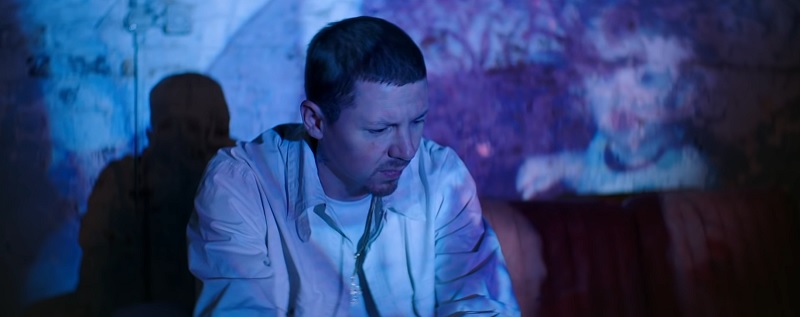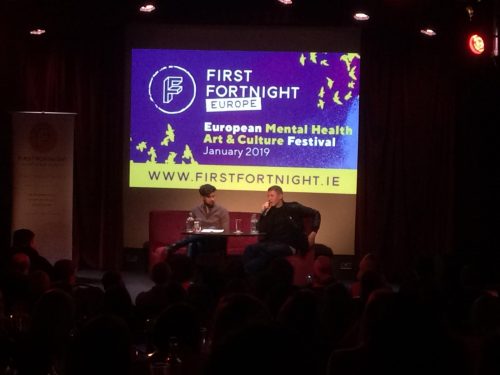Blog
“I had a few more bad days than good ones” – Professor Green in conversation with Eoghan McDermott
- January 23, 2019
- Posted by:
- Category: Blog Events External Affairs & Policy Of interest from media Stakeholders Uncategorized

Award winning musician, rapper, and mental health advocate Professor Green (Stephen Manderson) spoke with 2FM presenter, broadcaster Eoghan Mc Dermott as part of the First Fortnight festival in the Sugar Club last Saturday 19th January.
Professor Green, or ‘Pro Green’ as he is also known, spoke about his own experience with mental health difficulties, how it has affected his career and creative output, and the impact his fathers suicide has had on his life, creating a willingness to open up about his vulnerabilities and create awareness on these important topics. An advocate for several campaigns on mental health awareness he has touched on various topics including depression, male suicide, poverty, and other challenges facing the vulnerable in society.

He is a patron for the charity CALM (Campaign Against Living Miserably) and has made a documentary series for the BBC including: Suicide & Me (2015), Hidden and Homeless (2016), and Living in Poverty (2017) . In November 2016 Professor Green received the MIND Making a Difference National Award rewarding his dedication to campaigning about men’s mental health through his documentaries, music, autobiography and media work.
Stephen Manderson grew up in Hackney, East London, with his grandmother as his legal guardian after his mother, who had him at 16, left when he was 1. Early life was chaotic, with six people living in a 3-bedroom flat. His relationship with school was turbulent, he went to three different primary schools, had poor attendance at high school and was ultimately expelled. Education wasn’t encouraged or pushed on the young musician, despite an opportunity to attend the prestigeous boys’ private school St Paul’s in North London, “I knew my place in society”, he explained.

At the age of 18 he started rapping and despite the growth of his fame his anxiety and depression continued to affect him, “I had a few more bad days than good ones.” As a ‘person of interest’ he felt that his wasn’t allowed to complain and struggled to open up about his difficulties.
“I thought if I became successful in music or was financially stable all my problems would go away… I had no right to complain, I had made it and people were looking at me like I was perfect, and like no one likes to hear a whinging pop star.”
One of the biggest turning point for Pro Green was the death of his father by suicide when he was 24. He stopped using all recreational drugs, “I wanted to feel how I felt, I needed to process it.” Throughout his life his relationship with his father was “very disfunctional” and “toxic”, and despite attempts to salvage the relationship, Green decided to distance himself from him in favour of self preservation.
It was ultimately his fathers suicide that led him on a search for understanding, which had potentially dangerous repercussions,
“I’d only understand him if I got to the place he was in before he took his own life but realised I didn’t want to be in that place, so instead I made a documentary called Suicide and Me.
Originally the documentary was supposed to be about male mental health, but it became something more for Pro Green who for the first time opened up to showing his vulnerabilities, something he feared but understood was necessary in order to make change and challenge stigma.
He also spoke about his social media campaign #PHOTOGRAPHS, which coincides with his song and music video Photographs, which allows people to openly grieve about loved ones they have lost to suicide. “We need to be more open about grieving, when people are given the opportunity they do want to open up, some people grieve in isolation which can be really tough.”
His father’s death was not the only psychological bump in his life, the rapper was stabbed in the neck with a broken bottle in a nightclub in 2009. His attacker, Anthony Jones, was jailed for eight years.
Four years later, his leg was crushed between two parked cars outside his home when a driver accidentally put his foot on the accelerator leaving him with a compression fracture and snapped ligament. This accident, he said, was emotionally and physically debilitating and plunged him into depression.
“Quite often it’s not just the physical scars, its also the mental ones you are left with.”
“I was on anti depressants and they helped me but I’m off them now. There are other things you can do.” he said. Presenter Eoghan, pointed out the importance to distinguish the difference between what you can do for mental wellness, and medication and a diagnosis for people with life long debilitating mental illness to which Pro Green agreed.
When asked if he is hopeful for the future of mental health he said “The system isn’t looking very good, but I’m optimistic. The biggest hope that we have is in next generation. Kids are aware of mental health, when I was kid I didn’t know I had anxiety, I thought I just had a pain in my stomach.”
He also pointed out the links between social deprivation massively and mental health difficulties. “We know what the cost of keeping people in prison is, and what keeping them in hospital is, we should be investing in people when they’re young, for them to be supported, having psychologists in school, catch those problems early, and intervene early.”
“You only have to look into social issues to see that class issues play into mental illness.”
